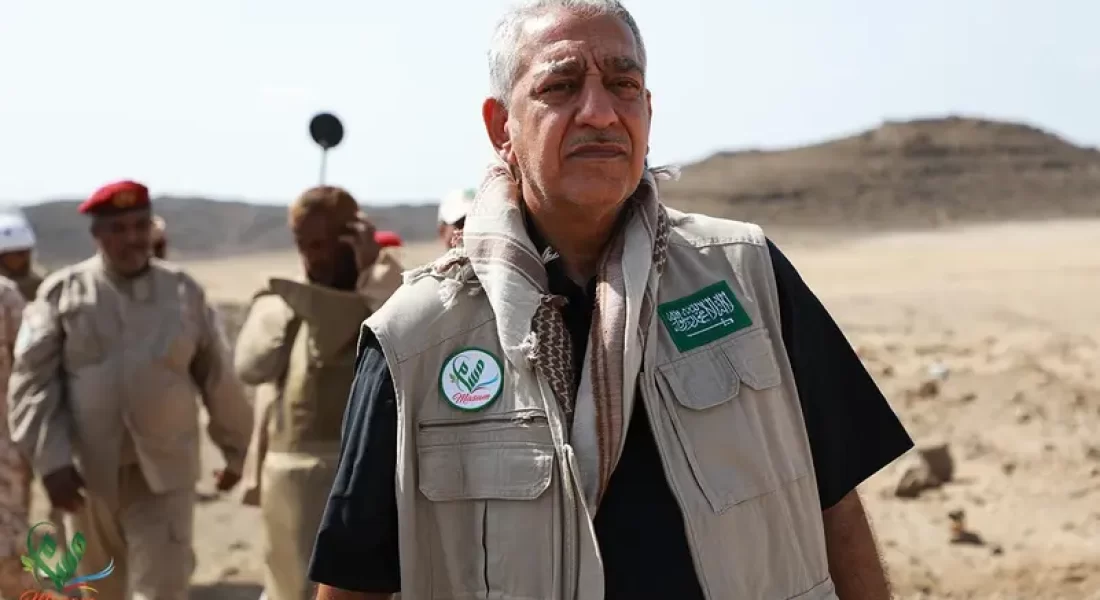“I dedicated my life to contributing to demining operations in many countries worldwide,” said Osama Al-Gosaibi who chose this career.
Having trained in the hands of British mine and explosives expert Guy Luxe during the Gulf War for 10 years, Al-Gosaibi is currently Project Masam’s Managing Director.
Al-Gosaibi, who worked with the United Nations in southern Lebanon in October 2001, was the first Arab to obtain a certificate from the United Nations Mine Action Service (UNMAS), Al-Gosaibi told Al Arabiya.net in a recent article.
Al-Gosaibi talked about his scientific and practical career, and about managing Project Masam, in addition to the most important challenges his teams faced.
“In December of 2017, I was honored to be asked to manage Project Masam to remove and clear Yemeni lands of mines – and the project has been ongoing for year now without interruption. During the Covid-19 crisis, Masam also continued to save Yemeni civilians which is considered the most important humanitarian task in the Yemeni territory.”
The idea Project Masam
During the interview, Al-Gosaibi explained that the idea of Masam project came about when experts were discussing the best way to help the Yemeni people overcome the tragedies caused by the widespread presence of indiscriminately planted landmines and improvised explosive devices (IEDs) in many Yemeni governorates, and enable them to live in peace.
Launched in mid-June 2018 to bring safety to Yemeni civilians under the umbrella of the King Salman Center for Relief and Humanitarian Action, Masam is led by Saudi experts, international experts, and Yemeni cadres trained to carry out this task.
“Project Masam’s motto is a “Life without Mines”. This phrase sums up the lofty goal of the project aimed to clear the Yemeni lands of mines. It is primarily a humanitarian project that aims to remove and destroy mines and IEDs, which have claimed the lives of many unarmed civilians, children, women and the elderly.”
Figures and Statistics
Al-Gosaibi explained: “Four years since the launch of Project Masam, the project has removed more than 358,863 landmines, improvised explosive devices and unexploded ordnance including 213,930 unexploded ordnance (UXO), 7,467 IEDs, 131,890 anti-tank mines and 5,576 anti-personnel mines. The engineering teams were also able to clear 38,487,863 square meters of land in Yemen that was booby-trapped with mines and IEDs.
All these types of mines were removed by Masam’s engineering teams in 11 Yemeni regions, namely: Sanaa, Al-Jawf, Shabwah, Marib, Al-Hodeidah, Taiz, Aden, Al-Bayda, Saada, Al-Dhalea, and Lahj.
Masam teams deal with two types of well-known landmines, and the locally-developed mines by Houthi militias in their own factories of different shapes and sizes – representing 85% of the total mines cleared.
Teams also deal with the IEDs that were developed and camouflaged by the militia in the form of stones, iron concrete and other familiar and deceptive forms. In one case, the militia turned bean cans into explosives, placing pieces of iron, a quantity of gunpowder and an explosive filling connected to an electric capsule that would blow up as soon as any civilian or animal approached.
IEDs have also be found to have been camouflaged in the form of booby-trapped rocks or exploding palm tree trunks, and placing them on civilians’ farms. The project also deals with IEDs placed in car tires.
Deminers were able to remove huge quantities of camouflaged and dangerous high-explosive mines. Among the dangerous forms used by the militia in recent times are the gauntlet mines, or what is known as fission mines, which are classified as anti-personnel mines.
Challenges facing Project Masam
“Today, we are not facing demining operations in the traditional sense, but rather a war of mines and IEDs which we deal with using state-of-the-art technologies, and with ongoing training of teams to effectively deal with camouflaged, new and constantly evolving mines planted indiscriminately over large areas and in numbers of up to hundreds of thousands, in accordance with international standards related to mine clearance.
Al-Gosaibi continued: “Every time one of my colleagues is killed in the operation of removing and clearing land from mines, I lose a part of myself and the situation remains stuck in my memory – that cannot be forgotten over the years. We all believe that in the field of demining, we offer this sacrifice and this is the highest form of sacrifice to save human lives.”
He added: “The field of demining is dangerous, and we know the seriousness of this task. Every day you go into the field, you are at risk of losing your life by exposing yourself to a fatal injury or permanent disability”.
The Managing Director indicated that four years since the launch of Project Masam in July 2018, thirty members of Masam’s teams were killed including five foreign experts, while 52 others were injured while performing their demining duty.

